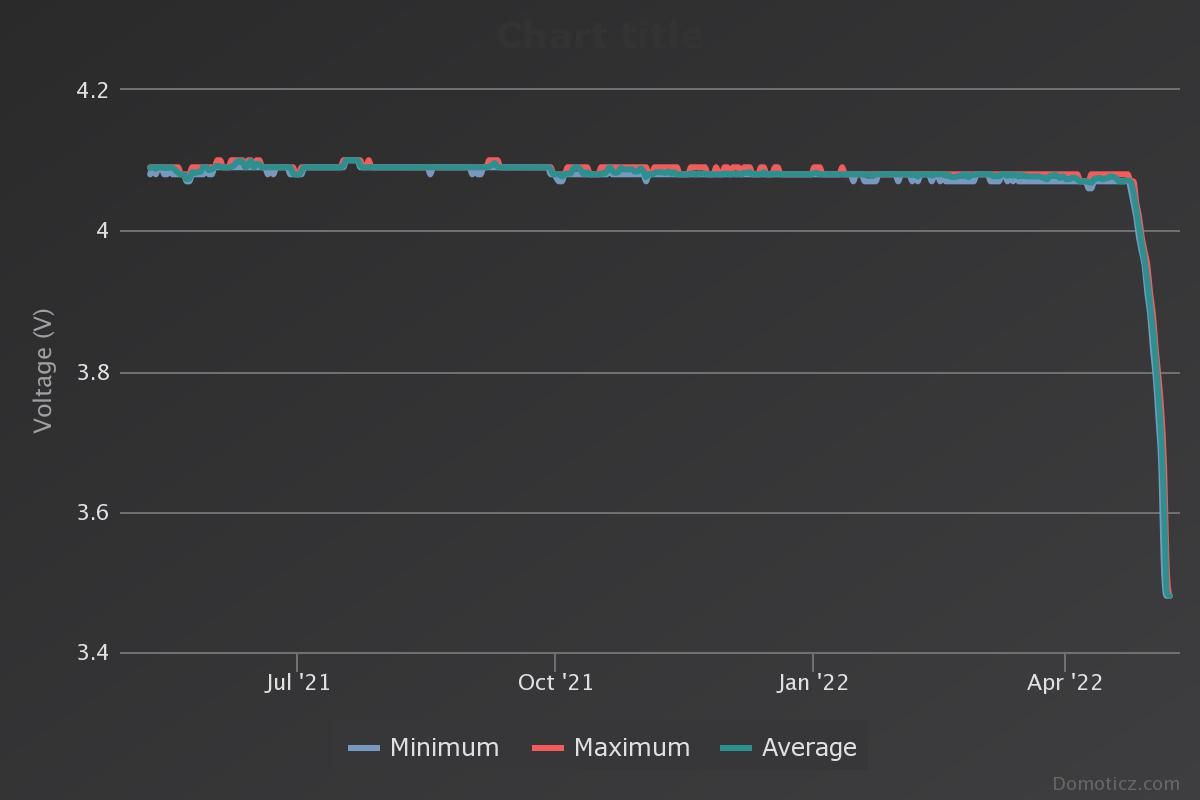Sudden Dead node, and consequent !TSM:FPAR:NO REPLY
-
Hi all,
A quick sence check please, before I have to build a new node.
One of my battery powered PIR sensors in the home, suddenly stopped communicating, node has been in existence for well over 18 months, working flawlessly, no hangups or anything.
I received a email from my domoticz system, when there had been no coms for a period of time from the node.
I looked at the reported battery voltage, and thought, ok, time for a recharge (LIPO battery), in fact it's first recharge.
after charging, nothing, did not show up again in domoticz, so plugged into the pro-mini, to see the serial output, of which there wasn't any, as the debug wasn't enabled. Reflashed code, with debug enabled, and node cannot find any parent? whilst I am going this, I am sat on my sofa, 10 feet from the gateway, and another node which is a repeater. I fiddle with the tx power, to make sure it's now not too high, for its current (temporary location) I try it in it's normal location as well, equally no joy.Here is the log, well a bit of it
60194 TSF:TRI:TSB Motion 0 60246 !MCO:SND:NODE NOT REG RAWbatcount :987 batV :4.10 batP :88 60665 !MCO:SND:NODE NOT REG 60667 !MCO:SND:NODE NOT REG Sleep 3000 60672 MCO:SLP:MS=3000,SMS=0,I1=255,M1=255,I2=255,M2=255 60678 !MCO:SLP:TNR Sleep infinit 63680 MCO:SLP:MS=3600000,SMS=0,I1=1,M1=1,I2=255,M2=255 63686 !MCO:SLP:TNR 66232 TSM:FAIL:RE-INIT 66234 TSM:INIT 66236 TSM:INIT:TSP OK 66240 TSM:INIT:STATID=21 66242 TSF:SID:OK,ID=21 66244 TSM:FPAR 67246 ?TSF:MSG:SEND,21-21-255-255,s=255,c=3,t=7,pt=0,l=0,sg=0,ft=0,st=OK: 69255 !TSM:FPAR:NO REPLY 69257 TSM:FPAR 70260 ?TSF:MSG:SEND,21-21-255-255,s=255,c=3,t=7,pt=0,l=0,sg=0,ft=0,st=OK: 72269 !TSM:FPAR:NO REPLY 72271 TSM:FPAR 73273 ?TSF:MSG:SEND,21-21-255-255,s=255,c=3,t=7,pt=0,l=0,sg=0,ft=0,st=OK: 73689 MCO:SLP:MS=3589999 73691 TSF:TDI:TSL 73693 MCO:SLP:WUP=1 73695 TSF:TRI:TSB Motion 0 73748 !MCO:SND:NODE NOT REG RAWbatcount :987 batV :4.10 batP :88 74166 !MCO:SND:NODE NOT REG 74168 !MCO:SND:NODE NOT REG Sleep 3000 74172 MCO:SLP:MS=3000,SMS=0,I1=255,M1=255,I2=255,M2=255 74178 !MCO:SLP:TNR 75282 !TSM:FPAR:NO REPLY 75284 TSM:FPAR 76288 ?TSF:MSG:SEND,21-21-255-255,s=255,c=3,t=7,pt=0,l=0,sg=0,ft=0,st=OK: Sleep infinit 77180 MCO:SLP:MS=3600000,SMS=0,I1=1,M1=1,I2=255,M2=255 77187 !MCO:SLP:TNR 78297 !TSM:FPAR:FAIL 78299 TSM:FAIL:CNT=4 78301 TSM:FAIL:DIS 78303 TSF:TDI:TSL 87189 MCO:SLP:MS=3590000 87191 TSF:TDI:TSLhere is the battery voltage graph before failure

and a switch log, showing the working connection, when the voltage had dropped / dropping.

given that the voltage has dropped very quickly in recent time , see years chart below.

Do people think there has been a catastrophic failure on the radio module (RFM69HW)?
Here is the sketch, in reflashing this node to enable the debug, the version migrated from 2.2.0 to 2.3.2
I have also tried clearing the eeprom, and have restarted domoticz.// Enable debug prints //#define MY_DEBUG //#define MY_DEBUG_VERBOSE //#define MY_DEBUG_VERBOSE_RFM69 //#define MY_DEBUG_VERBOSE_SIGNING //#define MY_SIGNING_SOFT //#define MY_SIGNING_SOFT_RANDOMSEED_PIN 7 //#define MY_SIGNING_REQUEST_SIGNATURES #define MY_SPLASH_SCREEN_DISABLED //#define MY_DISABLE_RAM_ROUTING_TABLE_FEATURE #define MY_TRANSPORT_WAIT_READY_MS 20000 // Enable and select radio type attached //#define MY_REPEATER_FEATURE #define MY_RADIO_RFM69 #define MY_RFM69_FREQUENCY RFM69_433MHZ // Set your frequency here //#define MY_RFM69_MAX_POWER_LEVEL_DBM (13) // max. TX power 10dBm = 10mW #define MY_RFM69_TX_POWER_DBM (13) #define MY_IS_RFM69HW // Omit if your RFM is not "H" //#define MY_RF69_IRQ_PIN 2 //#define MY_RFM69_CS_PIN 9 // NSS. Use MY_RF69_SPI_CS for older versions (before 2.2.0) //#define MY_RFM69_ENABLE_ENCRYPTION //#define MY_RFM69_NETWORKID 100 // Default is 100 in lib. Uncomment it and set your preferred network id if needed #define MY_NODE_ID 21 //#include <MyConfig.h> //#include <Filter.h> #include <MySensors.h> //#include <TimeLib.h> //#include <Bounce2.h> //#include <avr/wdt.h> #include <Vcc.h> #define VCC_MIN 3.0 #define VCC_MAX 4.25 Vcc vcc; int rawbatteryLevel = 0; int prevbatterylevel=0; int scaledbatterylevel = 0; uint8_t batP = 100; float batV = 3.250; int oldBatteryPcnt = 0; const float BatVccMin = 3000; // Minimum expected Battery Vcc level, in Volts. const float BatVccMax = 4250; // Maximum expected BatteryVcc level, in Volts. const int MaxBattCount = 1023; const float BatVccCorrection = 4.15 / 4.18; // Measured Battery Vcc by multimeter divided by reported Vcc #define CHILD_ID_PRESENCE 4 #define CHILD_ID_RX_RSSI 5 #define CHILD_ID_BATVCC 6 int BATTERY_SENSE_PIN = A0; // select the input pin for the battery sense point const int PresenceDetect = 3; const long interval = 20000; unsigned long previousMillis,previousrelayMillis,previouprescence= 0; unsigned long debouncetime =0; bool myprescenceDetected = 0; bool Relaystate = 0; bool uplinkAvailable = true; bool requestState; bool firstStart = true; unsigned long MYsleepTime = 3600000;//SLEEP_SEC*1000 * SLEEP_MINS * 60 ; //period_t is an enum type defined in the LowPower library (LowPower.h) int sleepcnt =0; volatile long currenttime = 0; volatile long temptime = 0; //long lightLevel = 0; // Initialize message MyMessage msgPrescenceDetect(CHILD_ID_PRESENCE, V_TRIPPED); MyMessage msgRxRSSI(CHILD_ID_RX_RSSI, V_LEVEL); MyMessage msgVcc(CHILD_ID_BATVCC, V_VOLTAGE); void setup() { // put your setup code here, to run once: pinMode(PresenceDetect, INPUT); // interruptPin pinMode(2, INPUT_PULLUP); // interruptPin2 EIFR = (1<<INTF0) | (1<<INTF1);// prevent initial trigger, clear interrupt wait(100); EIFR = (1<<INTF0) | (1<<INTF1); // attachInterrupt(digitalPinToInterrupt(PresenceDetect), prescenceDetected, RISING); wdt_disable(); // Might be redundant as the bootloader should have done this already analogReference(INTERNAL); }//end setup void presentation() { // Send the sketch version information to the gateway and Controller sendSketchInfo("Motion Sensor", "1.0.1"); // Register all sensors to gw (they will be created as child devices) // present(CHILD_ID_LIGHTLEVEL, S_LIGHT_LEVEL,"LIGHT_LEVEL",true); // wait(250); present(CHILD_ID_RX_RSSI, S_SOUND, "Motion RX RSSI",true); wait(1000); present(CHILD_ID_PRESENCE, S_MOTION, "Prescence", true); wait(250); present(CHILD_ID_BATVCC, S_MULTIMETER, "Motion Battery V"); }//end presentation void loop() { // put your main code here, to run repeatedly: // Read digital motion value wait(50);// wait a bit, then read in level, avoid spurious noise as PIR holds high state for 27sec bool Motion = digitalRead(PresenceDetect) == HIGH; Serial.print("Motion "); Serial.println(Motion); send(msgPrescenceDetect.set(Motion?"1":"0")); // Send tripped value to gw // get the battery Voltage if(Motion == 0){ wait(5); rawbatteryLevel = analogRead(BATTERY_SENSE_PIN);// if(prevbatterylevel != rawbatteryLevel){ wait(5); long tempV=0; for(int i=1;i<=50;i++){ wait(5); rawbatteryLevel = analogRead(BATTERY_SENSE_PIN);// tempV=tempV + rawbatteryLevel; } rawbatteryLevel = tempV/50; prevbatterylevel = rawbatteryLevel; float scaledbatterylevel = map(rawbatteryLevel,0,MaxBattCount,0,BatVccMax );// changed it to milivolts float batV = scaledbatterylevel /(1000); // Battery voltage uint8_t batP = (((scaledbatterylevel - BatVccMin)*100)/(BatVccMax-BatVccMin)); //((input - min) * 100) / (max - min) #ifdef MY_DEBUG Serial.print("RAWbatcount :"); Serial.println(rawbatteryLevel); Serial.print("batV :"); Serial.println(batV); Serial.print("batP :"); Serial.println(batP); #endif wait(100); float volts = vcc.Read_Volts(); send(msgVcc.set(batV,2),false); if (oldBatteryPcnt != batP) { sendBatteryLevel(batP); oldBatteryPcnt = batP; } RX_SEND(); } } Serial.println("Sleep 3000"); sleep(3000); Serial.println("Sleep infinit"); // EIFR = 1;// clear interrupts // EIFR = 2; EIFR = (1<<INTF0) | (1<<INTF1);// clear interrupts sleep(digitalPinToInterrupt(PresenceDetect), CHANGE, MYsleepTime); }// end loop void receive(const MyMessage &message) { // We only expect one type of message from controller. But we better check anyway. if (message.isAck()) { #ifdef MY_DEBUG Serial.println("+Ack FMGW"); #endif } #ifdef MY_DEBUG Serial.print("*InMsgty :"); Serial.print(message.type); Serial.print(" MsgComd:"); Serial.print(message.getCommand()); Serial.print(" childID:"); Serial.print(message.sensor); Serial.print(" Switch:"); Serial.println(message.getFloat()); #endif if (message.type == V_STATUS || S_HEATER || V_LIGHT || V_HVAC_SETPOINT_HEAT || V_TEMP || S_HVAC) { if (message.getCommand() == 2){// THIS PROCESSES THE CONTROLLERS EXPECTED STATE OF THE OUTPUT // put code here to be executed when the message is from a request #ifdef MY_DEBUG Serial.print("REQ_Msg :"); Serial.print(message.type); Serial.print(" MsgCmd:"); Serial.print(message.getCommand()); Serial.print(" childID:"); Serial.print(message.sensor); Serial.print(" Switch:"); Serial.println(message.getBool()); #endif switch (message.sensor) {// the child ID case 1: break; case 6: break; } // end switch }// end msg=2 if (message.getCommand() == 1){// THIS PROCESSES DIRECTED COMMANDS #ifdef MY_DEBUG Serial.print("*InMsgty :"); Serial.print(message.type); Serial.print(" MsgComd:"); Serial.print(message.getCommand()); Serial.print(" childID:"); Serial.print(message.sensor); Serial.print(" Switch:"); Serial.println(message.getBool()); #endif switch (message.sensor) {// the child ID case 1: break; case 3: break; case 6: break; } // end switch }// end if msg = 1 }// end msg type function }// end void loop void prescenceDetected() { // action when interrupt button doesnt really do anyhing as edge triggered currenttime = millis(); if ((currenttime - debouncetime) > 2000) { myprescenceDetected = 1; } debouncetime = currenttime; } void RX_SEND() { send(msgRxRSSI.set(transportGetSignalReport(SR_RX_RSSI))); } void sendBatteryReport() { float p = vcc.Read_Perc(VCC_MIN, VCC_MAX, true); int batP = static_cast<int>(p); #ifdef MY_DEBUG Serial.print("Battery is: "); Serial.println(batP); #endif sendBatteryLevel(batP); } /* // This is called when a new time value was received void receiveTime(unsigned long controllerTime) { // Ok, set incoming time #ifdef MY_DEBUG Serial.print("Time value received: "); #endif if (controllerTime > 1525129200){ setTime(controllerTime); #ifdef MY_DEBUG Serial.print("Time value valid: "); Serial.println(controllerTime); #endif // RTC.set(controllerTime); // this sets the RTC to the time from controller - which we do want periodically timeReceived = true; #ifdef MY_DEBUG Serial.print(hour()); Serial.print(" "); Serial.print(minute()); Serial.print(" "); Serial.print(second()); Serial.print(" "); Serial.print(day()); Serial.print(" "); Serial.print(month()); Serial.print(" "); Serial.print(year()); Serial.println(); #endif } } */Any suggestions gratefully received.
Regards
Nigel -
I have had a similar problem with a couple of my nodes working perfect one day and dead the next.
I am not saying your problem is the same as what I have experienced but I had issues with the cheap pro minis particularly the smoothing caps on the Vcc side that basically turned into resistors and dragged down the battery etc etc…
It’s not uncommon for capacitors to do this after a number of years of use, but it a little strange to do this after a little over a year. That said my boards are Chinese clones which will likely be using the lowest cost and quality parts which they could find - as they say you get what you pay for!
I resolved my problem by tracing the caps on the Vcc and desoldered them and replaced with an good old fashioned electrolytic capacitor soldered onto the Vcc and Gnd pins, not pretty but it works.
If you have a spare pro mini or RFM69 I would start by simply swapping the boards out to see if the problem gets resolved or moves with the board swap - it’s not going to fix the problem but it will hopefully help you to localise the problem to one or the other boards.
-
I have had a similar problem with a couple of my nodes working perfect one day and dead the next.
I am not saying your problem is the same as what I have experienced but I had issues with the cheap pro minis particularly the smoothing caps on the Vcc side that basically turned into resistors and dragged down the battery etc etc…
It’s not uncommon for capacitors to do this after a number of years of use, but it a little strange to do this after a little over a year. That said my boards are Chinese clones which will likely be using the lowest cost and quality parts which they could find - as they say you get what you pay for!
I resolved my problem by tracing the caps on the Vcc and desoldered them and replaced with an good old fashioned electrolytic capacitor soldered onto the Vcc and Gnd pins, not pretty but it works.
If you have a spare pro mini or RFM69 I would start by simply swapping the boards out to see if the problem gets resolved or moves with the board swap - it’s not going to fix the problem but it will hopefully help you to localise the problem to one or the other boards.
Hi,
Yes cheap clones for me too.
Vcc remains at 3.282v (external egulator) after having been away from it for 10 days, lipo battery is still at 4.08v, with it constantly trying to find a parent.
Decent explanation though, I'm going to have to build another I think.Many thanks,
Nigel -
I have built new node, reusing PIR sensor, discrete resistors and caps, plus regulator. New pro mini and rfm69 and base PCB. Had to replace these items at once, as no real possibility of removing them. Worked straight away. I am assuming that the output stage of the rfm69 module had died, given that mysensors wasn't complaining about coms to the module.
-
I have built new node, reusing PIR sensor, discrete resistors and caps, plus regulator. New pro mini and rfm69 and base PCB. Had to replace these items at once, as no real possibility of removing them. Worked straight away. I am assuming that the output stage of the rfm69 module had died, given that mysensors wasn't complaining about coms to the module.
@Nigel31 glad you got a fix :+1:
